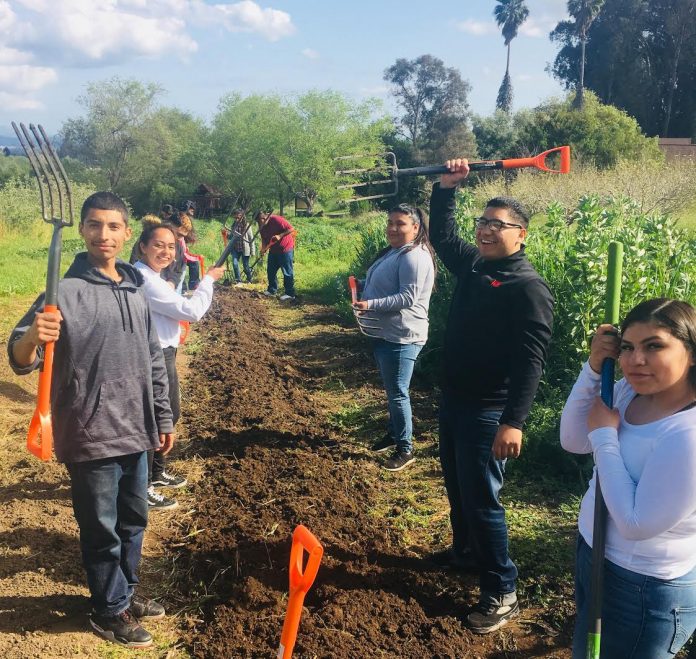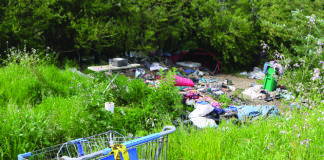There are about 1,800 nonprofits in Santa Cruz County. These three organizations are sharply focused on teaching the community how to grow, cook and create a healthy diet and lifestyle. Together, they create the ‘three-legged stool’ of nutritional education for young people and adults.
Food What?!
Established in 2007, FoodWhat?!, located on The Farm at UC Santa Cruz, is a youth empowerment and food justice organization. It engages kids in relationships with land, food and each other in ways that are grounded in love and rooted in justice. It also provides a space where youth define and cultivate their empowerment, liberation and well-being. A FoodWhat crew grows, cooks, eats and distributes fresh, healthy food while participating in programs providing food and nutritional education.
“We’ve adapted our program to meet the pandemic,” said Doron Comerchero, FoodWhat’s founder and executive director. “Every week, youth received a fresh produce box and kits with ingredients for healthy cooking. Connected online with staff, youth transformed the organic, fresh produce into heart-warming meals for their families. Youth also received five-gallon buckets with soil and seeds or plant starts for home food production. They engaged in weekly virtual gardening, swapped stories and celebrated their role in bringing food home.”
FoodWhat youth are developing relationships with healthy food on their own terms. They’re learning about its connection to personal and environmental health and extending that awareness to their families and communities. They learn about applying their strength to access opportunities that lead to radical diet change, personal growth and more.
For information, visit foodwhat.org/
Second Harvest Food Bank’s Cooking Club
Founded in 1972, Second Harvest Food Bank Santa Cruz County was the first food bank in California and is the second oldest in the nation.
“The focus of our Cooking Club is helping people move toward a greater inclusion of fresh vegetables,” said Delia Bernal, nutrition education manager at Second Harvest. “We’re not trying to make people go vegan, we just act as a food consultant about what to eat, when to eat and adopting new routines.”
The Cooking Club helps people find easy ways of adopting healthy food behavior. Club participants also learn kitchen skills and learn that they can find pleasure in healthy eating as well as satisfying hunger. Additionally, the club shares knowledge about making cooking fun, easy and nutritious.
“Food isn’t the same for everyone,” Bernal said. “Different diets are necessary for different people. We’re not all the same. We encourage applying old recipes with modifications for example a cauliflower casserole instead of mac & cheese. The secret is applying more diet creativity to eating. Existing flavors and textures with new recipes are key themes.”
Sarah Bowers said that through the program she learned about the importance of keeping fiber in her diet and what foods provide the most fiber. She also learned how to make salad dressing without sugar and preservatives.
“It saves me money and my family enjoys it too,” Bowers said. “I also thought it was fun trying to learn Spanish and chatting with the other ladies.”
For information, visit thefoodbank.org/
Life Lab
Drawing on more than 40 years of work with young people in gardens, Life Lab is a national leader in the garden-based learning movement. It provides a complex array of programs as a catalyst for interest in healthy foods. Its hands-on, garden-based childrens’ cooking education supports healthy eating and more effective learning.
For the past six years, Life Lab has been working with the Pajaro Valley Unified School District students.
“Life Lab helps children make connections about how plants grow and food,” said Judit Camacho, co-executive director. “Information only is not enough. Children learn via experience. They learn patience by growing food and how food is created.”
Life Lab offers a children’s cooking program in food preparation, sanitation and collaboration with other students. Roughly 75% of students said they enjoyed the program.
At the Life Lab Garden Classroom educational center in Santa Cruz and the Blooming Classroom garden in Watsonville, Life Lab promotes experiential learning for people of all ages through field trips, children’s camps and teacher workshops.
Started in 1979 by a team of teachers, a garden was created at Green Acres Elementary School in Santa Cruz. Since then, Life Lab has continuously engaged young people in gardens and taught others to do the same.
“Life Lab provides truly inspiring training,” said Erica Curry, a training and professional development manager for FoodCorps. “Their breadth of experience, joy for teaching and commitment to sharing knowledge highlight the best practices in food and garden education.”
For information, visit lifelab.org/











